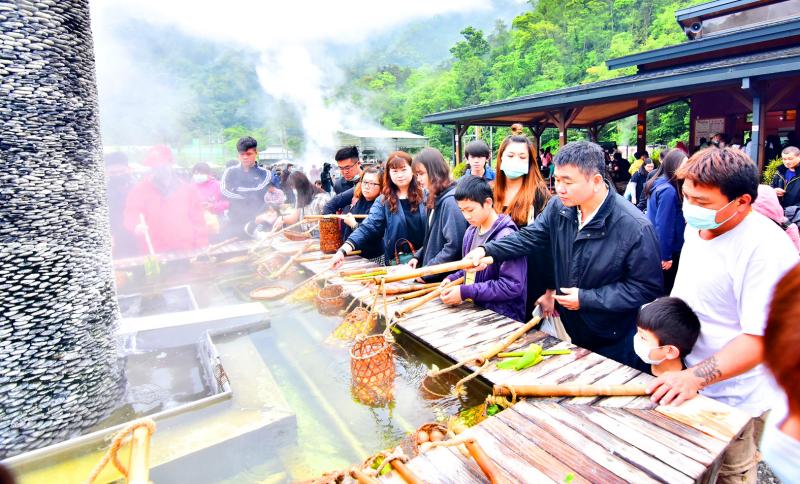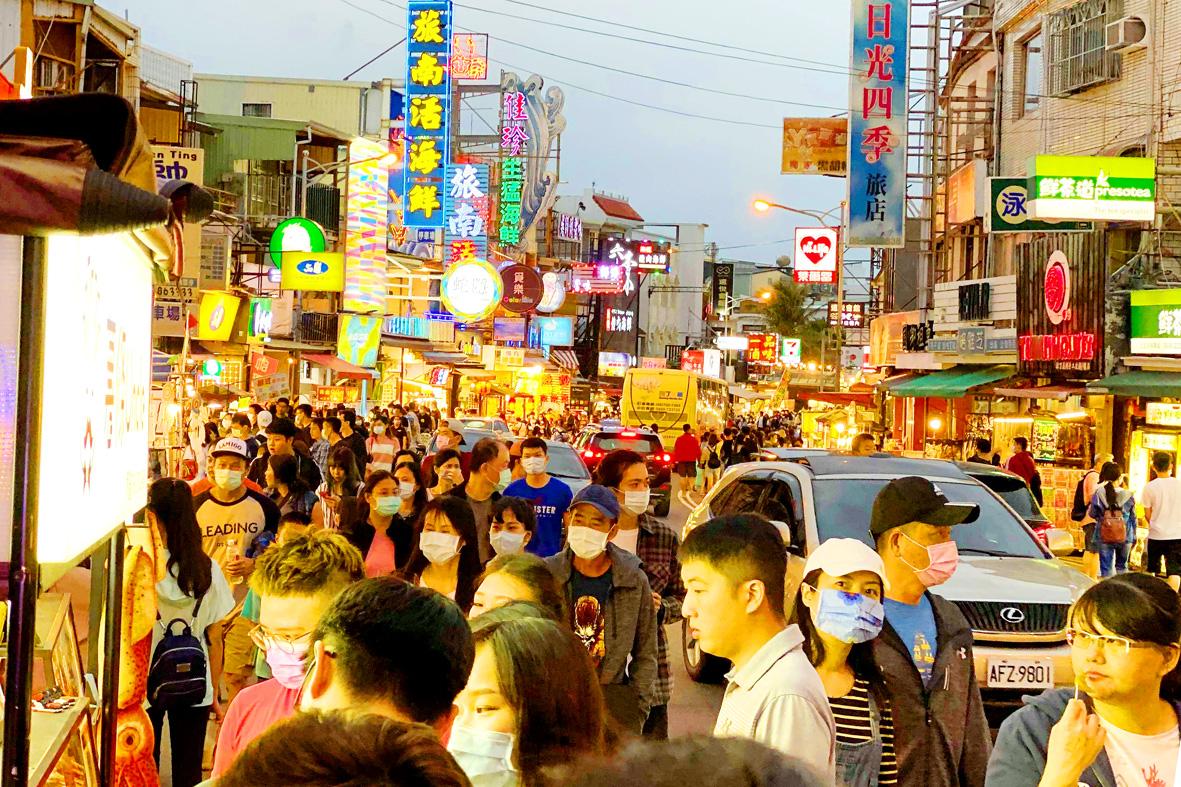The Central Epidemic Command Center (CECC) yesterday sent two warning text messages to urge people to practice social distancing, especially by avoiding crowded scenic areas.
The two messages were sent at 11:55am on the third day of the four-day Tomb Sweeping Day weekend, reminding people about social distancing and hand hygiene to help prevent COVID-19 infection.
“When visiting crowded scenic spots during the Tomb Sweeping Day weekend, please keep a social distance of at least 1.5m indoors and 1m outdoors, wear a mask and wash your hands frequently. Please wear a mask and seek immediate medical attention if you are feeling ill and call 1922 for inquiries,” the first message read.

Photo: Chang Yi-chen, Taipei Times
The second message read: “Please avoid going to scenic areas near Kenting (墾丁). Practice social distancing of at least 1.5m indoors and 1m outdoors, or wear a mask. Please wear a mask and seek immediate medical attention if you are feeling ill and tell the doctor your travel history. Call 1922 for inquiries.”
The first message was sent to cellphones near 11 scenic spots: Alishan National Forest Recreation Area (阿里山國家森林遊樂區); Dongdamen Night Market (東大門夜市) in Hualien County; Wenhua Road in Chiayi City; Guanzihling (關子嶺), Hutoupi (虎頭埤), Wushantou Reservoir (烏山頭水庫) and Wusanto Huching Resort Hotel in Tainan; Bade Pond Ecological Park (埤塘風景區) in Taoyuan; Singda Harbor (興達港) and Chishan Old Street (旗山老街) in Kaohsiung; and Chaotian Temple (朝天宮) in Yunlin County’s Beigang Township (北港).
The second message was sent to phones south of Pingtung County’s Nanjhou Township (南州), including Kenting National Park.

Photo: Tsai Tsung-hsien, Taipei Times
Minister of Health and Welfare Chen Shih-chung (陳時中), who heads the center, yesterday afternoon said that visitor numbers at scenic spots on the first two days of the holiday were greater than expected and people did not do a very good job of social distancing.
“We urge people who are already in those areas to keep the proper social distances and wear a mask, and others to avoid going,” he said, adding that traveling on holidays is relaxing, but social distancing should not be neglected, as there is an increased risk of virus transmission in large groups of people.
Asked whether the center is worried that high rates of domestic tourism on holidays might increase the spread of COVID-19, as happened in Japan and some doctors have warned, Chen said that community spread of the disease began in Japan before the cherry blossom season, while Taiwan has only a few sporadic domestic cases and everyone who returned to Taiwan from overseas was ordered into home quarantine.
After evaluating the risks and considering people’s vacation needs, the center did not announce a “stay home” order for the holidays, but people have to be extra careful and practice enhanced disease prevention measures, he said.
The CECC added that people should wear a mask on public transportation and cooperate with body temperature policies.
Those who refuse to cooperate would face a fine of up to NT$15,000, it said.

DAREDEVIL: Honnold said it had always been a dream of his to climb Taipei 101, while a Netflix producer said the skyscraper was ‘a real icon of this country’ US climber Alex Honnold yesterday took on Taiwan’s tallest building, becoming the first person to scale Taipei 101 without a rope, harness or safety net. Hundreds of spectators gathered at the base of the 101-story skyscraper to watch Honnold, 40, embark on his daredevil feat, which was also broadcast live on Netflix. Dressed in a red T-shirt and yellow custom-made climbing shoes, Honnold swiftly moved up the southeast face of the glass and steel building. At one point, he stepped onto a platform midway up to wave down at fans and onlookers who were taking photos. People watching from inside

A Vietnamese migrant worker yesterday won NT$12 million (US$379,627) on a Lunar New Year scratch card in Kaohsiung as part of Taiwan Lottery Co’s (台灣彩券) “NT$12 Million Grand Fortune” (1200萬大吉利) game. The man was the first top-prize winner of the new game launched on Jan. 6 to mark the Lunar New Year. Three Vietnamese migrant workers visited a Taiwan Lottery shop on Xinyue Street in Kaohsiung’s Gangshan District (崗山), a store representative said. The player bought multiple tickets and, after winning nothing, held the final lottery ticket in one hand and rubbed the store’s statue of the Maitreya Buddha’s belly with the other,

‘COMMITTED TO DETERRENCE’: Washington would stand by its allies, but it can only help as much as countries help themselves, Raymond Greene said The US is committed to deterrence in the first island chain, but it should not bear the burden alone, as “freedom is not free,” American Institute in Taiwan Director Raymond Greene said in a speech at the Institute for National Defense and Security Research’s “Strengthening Resilience: Defense as the Engine of Development” seminar in Taipei yesterday. In the speech, titled “Investing Together and a Secure and Prosperous Future,” Greene highlighted the contributions of US President Donald Trump’s administration to Taiwan’s defense efforts, including the establishment of supply chains for drones and autonomous systems, offers of security assistance and the expansion of

STREAMLINED: The dedicated funding would allow the US to transfer equipment to Taiwan when needed and order upgraded replacements for stockpiles, a source said The US House of Representatives on Thursday passed a defense appropriations bill totaling US$838.7 billion, of which US$1 billion is to be allocated to reinforcing security cooperation with Taiwan and US$150 million to replace defense articles provided to the nation. These are part of the Consolidated Appropriation Act, which the US House yesterday passed with 341 votes in favor and 88 against. The act must be passed by the US Senate before Friday next week to avoid another government shutdown. The US House Committee on Appropriations on Monday unveiled the act, saying that it allocates US$1 billion for the Taiwan Security Cooperation Initiative